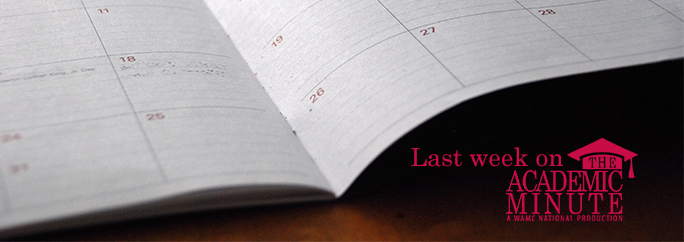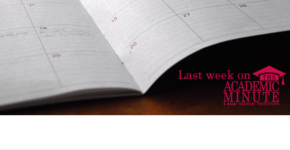
Academic Minute from 01.14 – 01.18
Monday, January 14th
Elizabeth Thomas – University at Buffalo
A Wetter Arctic
Elizabeth K. Thomas is a paleoclimatologist and geochemist. Her research aims to understand how changes in the Earth’s climate have affected precipitation patterns in various parts of the world — including the Arctic, areas affected by the Asian Monsoon, and the Great Lakes region — over the past several hundred thousand years.
Thomas conducts field research in the Arctic as part of teams studying how ice sheets and plant life may react to rising temperatures and altered Arctic precipitation patterns.
Closer to home, she is leading a project to examine the history of lake effect snow in Upstate New York. The goal of this work is to help scientists better predict whether such storms could become more frequent or intense in the future as the Earth warms.
Tuesday, January 15th
Doug Challenger – Franklin Pierce University
The Disenchantment of the World
Douglas Challenger is a professor of sociology & documentary studies at Franklin Pierce University in Rindge, New Hampshire https://www.franklinpierce.edu/where his research focuses on social and political theory, pilgrimage studies and the sociology of religion. His current project looks at the place of religion in post-secular societies.
In recent years, Challenger has been studying the Camino de Santiago–a 1,200 year-old pilgrimage route in Europe–that lay untraveled for hundreds of years, but is once again surging in popularity among pilgrims and hikers from all over the world. In his research, he studies how the Camino functions as a bridge between the modern secular world and the spiritual world, and is among the most significant examples of a trend that blends the two worlds in new ways in the 21st century.
Wednesday, January 16th
Matthew Wallenstein – Colorado State University
Reducing Food Waste
Dr. Wallenstein’s research focuses on the role of microbiomes in critical ecosystem processes. In ecosystems from the Arctic to arid grasslands, his lab has advanced our understanding of how microbes adapt to environmental change. Much of his current focus is on managing and engineering rhizosphere microbiomes to enhance sustainable agriculture. He is also interested in accelerating the translation of research to improve crop production through working across the supply chain.
Thursday, January 17th
Michael Grabowski – Manhattan College
Neuroscience and Horror Movies
My background is in film, television and new media production, and my work on documentaries, short and feature films, commercials, music videos, and news has been seen at the Guggenheim, the Smithsonian, in several film festivals, and on several broadcast and cable networks. I began my career in television over two decades ago at an NBC affiliate station before moving to New York in 1994. Currently, I consult on documentary story construction and trends in television, new media, and OTT audiences and programming.
Friday, January 18th
Md. Aynul Bari – University at Albany
Air Pollution in the Home
Md. Aynul Bari joined the Department of Environmental & Sustainable Engineering (ESE) at the University at Albany as an Assistant Professor in Fall 2018. Bari has been involved in assessing emerging air quality issues in urban and industrial areas in order to explore the need for addressing clean air strategies to support initiatives of achieving sustainable air quality. His current research focuses on understanding ambient levels and sources of per- and poly-fluoroalkyl substances (PFASs), influence of energy development on air quality and atmospheric deposition, long-term trend analysis, source characterization and apportionment and low-cost air pollution sensors. Other research interests include residential wood burning, particulate air pollution, indoor and outdoor behavior of air pollutants and air toxics, and public health risk assessment.
